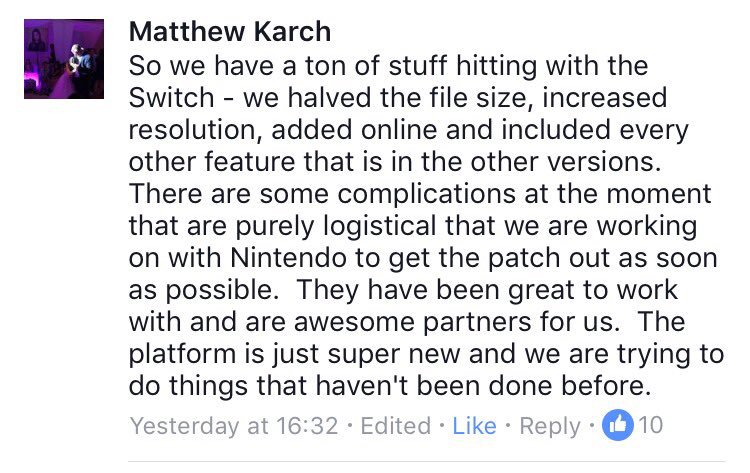It's not different at all, that's my whole point. Developers don't care about the distinction, publishers don't care about the distinction, and (on balance) gamers don't care about the distinction. We live in an Early Access world where many games have three times as much content, and sell three times as well, three years after they come out.
People assert this all the time but I've never actually seen the evidence that it's a real trend of relevant significance. Everything on PC had early patches in 2006 too, it was just miserable to actually download them; games still shipped broken as hell on PS2, it's just that those games were bad forever instead of getting fixed a couple days later. The idea that on net people are getting buggier and less playable experiences today doesn't really hold up.
Yeah, it's always a little funny when someone who's very upset about Nintendo system third-party support is also in favor of the kinds of developer-hostile policies that are responsible for reduced third-party support on the platforms that have them.
There is a tad of a revisionist history in this post. Patching did not start in 2006, or xbox360 generation as is implied. Patching has been going on since the early days of snes, with multiple versions of cartridges. The only difference between now and then was the process was seamless and unnoticeable back then, often at the expense and inconvenience to the publisher and not to the consumer. There was a monetary incentive for publishers to get the game right the first time around.
As far as third party support, again revisionist history. Third party has never suffered because of any particular policy Nintendo instituted. Save for the N64, every system Nintendo has release has had either great third party support or poor third party support and none of the blame or credit can be given to Nintendo. Nintendo started with the NES and single handily revived the video game market. Nintendo enjoyed copious third party collaborations and created enduring series that began during this era. The SNES continued the success of the NES and had great third party support. The N64 was an aberration because Nintendo bet on the wrong side of history with the cartridge and the difficult to develop architect. The PSX/N64 era was the turnaround point where Nintendo would be seen as the system with poor third party. Gamecube flopped because it came out too late and suffered from fallout of the N64 and the early success of the PS2, despite having superior technology. Wii third party support was never a problem for the few who knew how to make games for the wii's audience, just dance being an example. The reason third party was lacking on the Wii was because third parties could not compete with Nintendo's first party offering and found their success making AAA titles on the PS3/Xbox360 instead.
The Wii U's failure is too early to call but I believe it failed because Nintendo was catering too much on third parties. Its launch was filled with mostly third party ports. It was a confusing message for consumers, who were mostly interested in Nintendo's first party titles and probably don't want third party ports. Had the WiiU had a Zelda BotW, followed by Mariokart, Smash Bros, Splatoon release calendar early in its life cycle, the WiiU might have been a huge success. But since Nintendo let the third party ports highlight the WiiU's launch, Nintendo lost any momentum off the bat and doomed itself.
Great thing about the Switch is Nintendo understands the leverage it has from its first party lineup and is basically writing off third parties support save for indie titles. Frankly for consumers and Nintendo itself, this strategy may be best. Consumers don't want inferior half baked ports and Nintendo can just sell switches fine with its must have first party titles.

